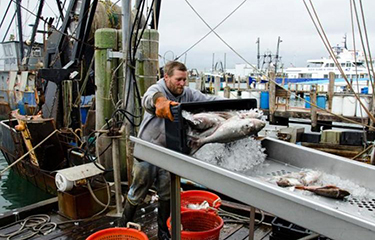A pair of fishery status updates released by NOAA Fisheries on Thursday, 12 May, 2022, have revealed the profound impact the COVID-19 pandemic had on the U.S. fishing industry, which experienced double-digit percentage decreases in landings and value.
According to an update made to NOAA Fisheries' "Fisheries of the United States 2020" report, U.S. fishermen reported 8.4 billion pounds of landings for 2020, down 10.4 percent from 2019. The value of those products was reported at USD 4.8 billion (EUR 4.63 billion), down 14.6 percent from the year before.
“These decreases are consistent with our expectations because of the disruption and the impacts of COVID-19 as well as storm impacts in the Gulf of Mexico,” NOAA Fisheries Assistant Administrator Janet Coit said.
It’s the third-straight year landings have decreased, according to NOAA Fisheries records.
Alaska’s Dutch Harbor once again led the U.S. in terms of volume of landings. The port took in 800.2 million pounds in 2020, with a value of USD 186.7 million (EUR 180 million). New Bedford, Massachusetts, remained top port by value, with the 115.4 million pounds of seafood landed there worth USD 376.6 million (EUR 363.1 million).
As landings declined, so too did consumption. According to the report Americans on average ate 19 pounds of seafood in 2020, down from 19.3 pounds in 2019.
NOAA Fisheries also reported in its Status of the Stocks report, that more than 90 percent of the stocks it tracks are not subject to overfishing, as of 2021. The agency reported that 26 stocks remain on the overfishing list, while the overfished list grew from 49 to 51.
“NOAA’s annual Status of Stocks report shows that the United States continues to be a global leader in sustainable fisheries management, as we work to understand how climate change is affecting fisheries and the communities that this sector supports,” NOAA Administrator Rick Spinrad said in a statement.
Not everyone took that as a sign of progress, however.
In a statement after NOAA Fisheries’ announcement, Oceana said that the overfished stocks represent one-fifth of the stocks tracked. Oceana also said the report showed that managers do not have enough data to properly track nearly half of U.S. fisheries.
Oceana Fisheries Campaign Director Gib Brogan said in a statement that it was disappointing to see a lack of progress in U.S. fishery management.
“We need government agencies to insist on success and accountability,” Brogan said. “Delaying needed action harms not just our oceans, but also the communities that depend on these fisheries. Even in a changing ocean, robust fisheries can be balanced with recovery, but NOAA must lead the way.”
Photo courtesy of NOAA Fisheries







